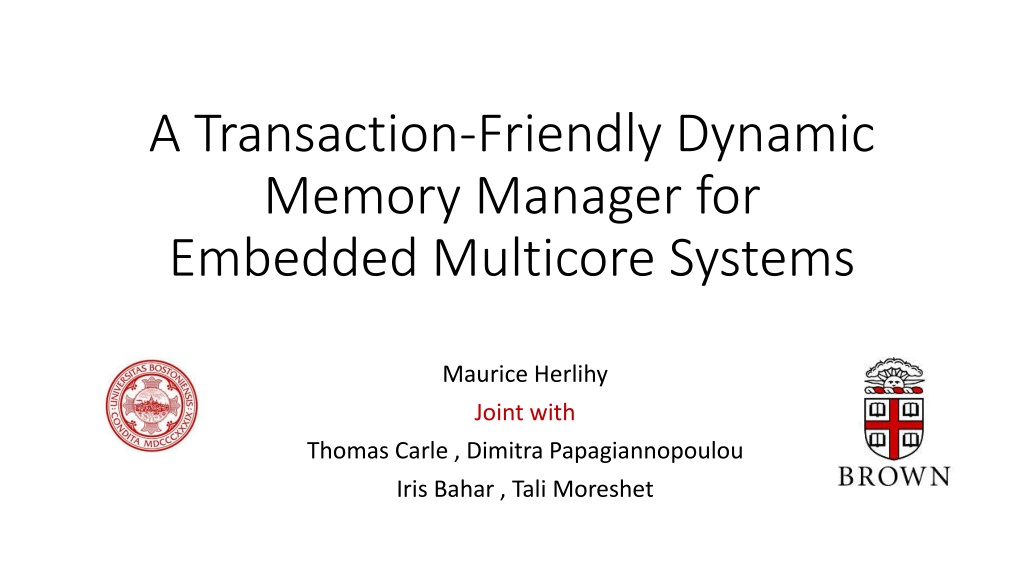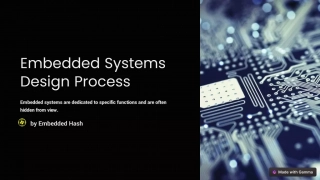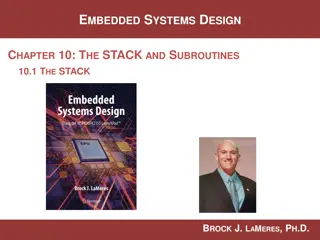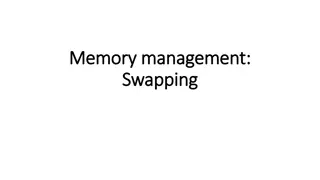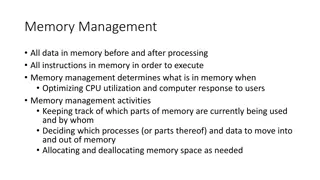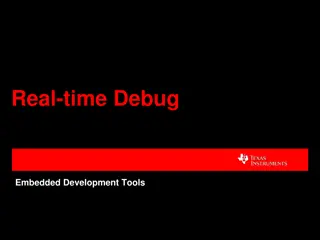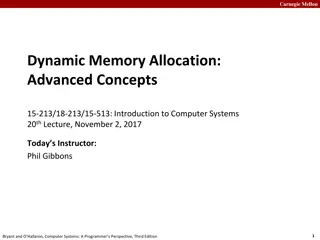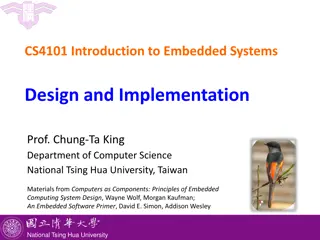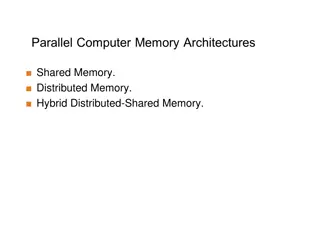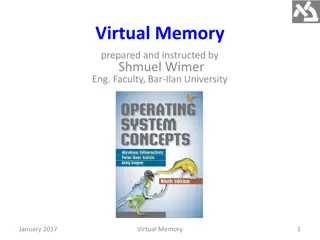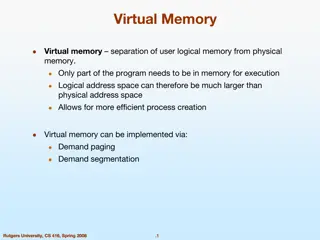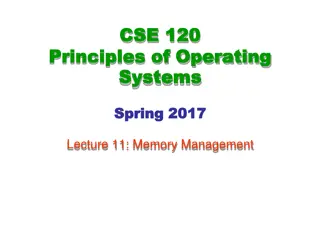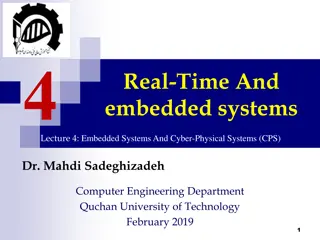Efficient Dynamic Memory Management for Embedded Multicore Systems
This content delves into the challenges of dynamic memory management in embedded multicore systems, emphasizing the importance of transaction-friendly approaches. It covers parallel data structures, the role of operating systems/libraries, and principles of memory allocation. Through illustrations and descriptions, the complexities and strategies involved in managing dynamic memory efficiently are explored.
Download Presentation

Please find below an Image/Link to download the presentation.
The content on the website is provided AS IS for your information and personal use only. It may not be sold, licensed, or shared on other websites without obtaining consent from the author. Download presentation by click this link. If you encounter any issues during the download, it is possible that the publisher has removed the file from their server.
E N D
Presentation Transcript
A Transaction-Friendly Dynamic Memory Manager for Embedded Multicore Systems Maurice Herlihy Joint with Thomas Carle , Dimitra Papagiannopoulou Iris Bahar , Tali Moreshet
Modern Embedded Systems now many core, distributed memory Parallel data structures Locks don t scale Transactions do (m s o menos) 2
Dynamic Memory Management Software s oldest profession> Usually provided by OS/Libraries For parallel data structures on embedded platforms with HTM 3
High-End Embedded Systems simplicity small memory footprint resource needs roughly known in advance but not always exactly 4
Dynamic Memory Management Heap is linked list or binary tree Applications explicitly malloc() and free() memory Size: 16 bytes Start: 0x0800000 Size: 64 bytes Start: 0x0800100 5
Principles of dynamic memory management Allocate a 32-byte chunk Size: 16 bytes Start: 0x0800000 Size: 64 bytes Start: 0x0800100 Large enough Too small 6
Dynamic Memory Management Allocate a 32-byte chunk Size: 16 bytes Start: 0x0800000 Size: 64 bytes Start: 0x0800100 7
Dynamic Memory Management Allocate a 32-byte chunk Size: 16 bytes Start: 0x0800000 Size: 64 bytes Start: 0x0800100 Size: 32 Bytes Start: 0x0800100 Size: 32 Bytes Start: 0x0800120 8
Principles of dynamic memory management Allocate a 32-byte chunk Size: 16 bytes Start: 0x0800000 Size: 64 bytes Start: 0x0800100 Size: 32 Bytes Start: 0x0800100 Size: 32 Bytes Start: 0x0800120 9
Principles of dynamic memory management Allocate a 32-byte chunk Size: 16 bytes Start: 0x0800000 Size: 32 Bytes Start: 0x0800120 Size: 32 Bytes Start: 0x0800100 10
Dynamic Memory Management is a concurrent data structure problem steps must be atomic 11
Fast Path Thread-local pools successful malloc() and free() need no synchronization Calls happen inside transaction Speculative allocation can speed up the execution 12
Slow Path If local pool exhausted, must allocate from shared heap Allocate within transaction means more conflicts Instead: 1. abort current transaction 2. allocate fresh local pool 3. restart transaction 13
Benefits Transactions have smaller footprints Disentangles application shared heap management Transactions more likely to commit 14
Transaction-friendly memory management At application startup: 1. One thread initializes the heap 2. Each thread allocates its own local pool 15
Transaction-friendly dynamic memory management Commit allocation transaction Free remaining pool and allocate fresh pool Enter allocation transaction Abort transaction no malloc() Next Enough memory? Allocate from local pool Instruction ? Enter transaction yes Return allocated chunk 16
Transaction-friendly dynamic memory management free() Next Instruction ? Enter transaction Free to local pool 17
Evaluation STAMP Vacation benchmark 1, 2, 4, 8 and 16 cores Local pools large enough so no refill needed Tested: transactional with local pools lock-based with local pools lock-based without local pools 18
Evaluation Vacation benchmark (Normal run) worse better 19
Evaluation (2) Vacation benchmark (Refill mechanism on one core) 8 cores local pool sizes: 64, 128, 256, 512, 1024, 2048 bytes Transactional synchronization 20
Evaluation (2) Vacation benchmark (Refill mechanism on one core) 21
Evaluation (3) Vacation benchmark (Refill mechanism on all but one core) 8 cores local pool sizes: 64, 128, 256, 512, 1024 or 2048 bytes Transactional synchronization 22
Evaluation (3) Vacation benchmark (Refill mechanism on all but one core) worst case: 20% increase in execution time Wall between 512 and 1024 bytes: refills may induce additional conflicts 23
Conclusions Dynamic memory management for Embedded TM Results Better than locking, in-transaction malloc More flexible than static allocation Future work More benchmarks Explore new fallback reprovision strategies Memory stealing between threads 24
